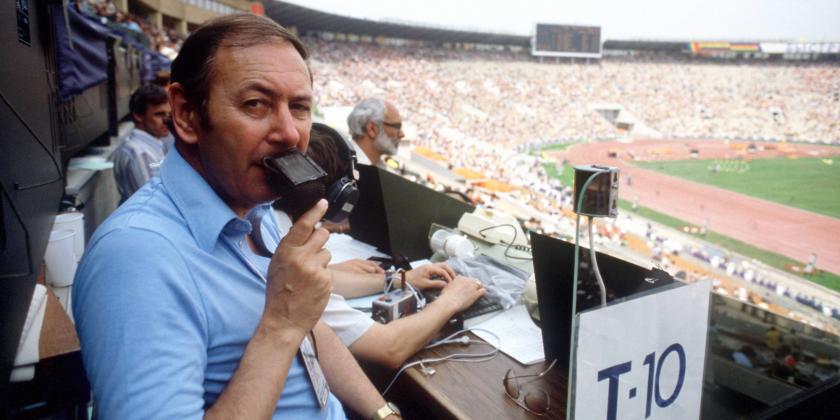It says something about your status in broadcasting when you inspire not only a Spitting Image puppet, but also have a Private Eye column named after you. Presenter, commentator, interviewer and quizmaster David Coleman, as the title says, really was quite remarkable, a broadcaster as well known as the sportsmen and women whose achievements he commented on for four decades, and celebrated for his distinctive style in front of a microphone.
He died in December and this tribute, an updated version of Carl Doran's film aired in 2011 to celebrate Coleman's 85th birthday, was an affectionate run-through of a career dedicated to sport. Coleman was a useful middle-distance runner in his youth and became a PE instructor in the Army during his National Service, but his knowledge and love of sport was broad. He covered 11 summer Olympic Games between 1960 and 2000, eight Commonwealth Games, six football World Cups and numerous football cup finals, both domestic and foreign, the Grand National and much more. He was for at least two generations the voice of big sporting events and helped develop much of what we now take for granted in television coverage. Fellow commentator Barry Davies said: “I was in awe of him, as was just about everybody at the BBC.”
By the late 1960s Coleman was BBC sport, presenting Grandstand, Sports Review of the Year and his interview show, Sportsnight With Coleman, which drew huge viewing figures. Later he fronted A Question of Sport (pictured with team captains Bill Beaumont and Ian Botham, below). Sebastian Coe wryly remarked that Coleman was never short of an opinion – but, he added, the broadcaster was usually right and his knowledge meant he was respected by athletes. Among the archive footage there was a touching moment during an interview with Ann Packer the day after she won Olympic gold in the 800 metres at Tokyo 1964. She becomes tearful as she hears Coleman's commentary for the first time and she described that moment in 2011. “His commentary made it special,” she said, and that it only became real when she heard his description of her achievement.
 He had a distinctive style (another broadcasting legend, Michael Parkinson, described it affectionately as “his enthusiasm bordered on hysteria at times”) and several contributors to Doran's film did an impression of his trademark “one-nil” from football commentaries. (Coleman also overused the phrase "quite remarkable", hence the title.) But he could equally capture a moment in one sentence; when Cathy Freeman became the first Aboriginal athlete to win a gold medal in a solo event, the 400m at Sydney 2000, he said: “She had the world at her feet and a nation's soul on her back.”
He had a distinctive style (another broadcasting legend, Michael Parkinson, described it affectionately as “his enthusiasm bordered on hysteria at times”) and several contributors to Doran's film did an impression of his trademark “one-nil” from football commentaries. (Coleman also overused the phrase "quite remarkable", hence the title.) But he could equally capture a moment in one sentence; when Cathy Freeman became the first Aboriginal athlete to win a gold medal in a solo event, the 400m at Sydney 2000, he said: “She had the world at her feet and a nation's soul on her back.”
“His finest hour”, as Davies put it, came at the Munich Games in 1972, when Black September terrorists took hostage and killed 11 members of the Israeli team; Coleman, live and unscripted, described the unfolding events for several hours. A few days later, deeply affected by the events, he covered the closing ceremony, striking just the right note in what Coe called a “sublime piece of observation”. Both, and his commentary of the memorial service for the dead, were remarkable pieces of broadcasting.
There is generally an irritating tendency to deify the dead in tributes like this, and it was refreshing that Doran put some light and shade in the picture. He wasn't a tyrant by any means, but Coleman, a consummate professional himself, could be a demanding colleague, as several contributors acknowledged - describing his rants at errant cameramen or producers. It was also revealing to hear all his six children and some of his grandchildren talk about him as a dedicated family man. One of his daughters said that, despite his busy schedule, Coleman made a great effort to be home for supper when they were young, even if it meant another dash to the studio for a live late-evening broadcast.
There were a few too many talking heads saying the same thing and not enough archive footage of the great man at work. And surprisingly, given that he gave the English language a new word – Colemanballs, as in Private Eye – none of his gaffes was given an airing, with just the briefest of mentions of his Spitting Image puppet. He hated both, apparently, which suggests a vain or pompous man. But perhaps more tellingly broadcasters and sports people were lining up to pay tribute and Sue Barker, Coleman's successor on A Question of Sport, said he refused any fanfare when he left the BBC in 2000 after more than 40 years with the Corporation.















Add comment